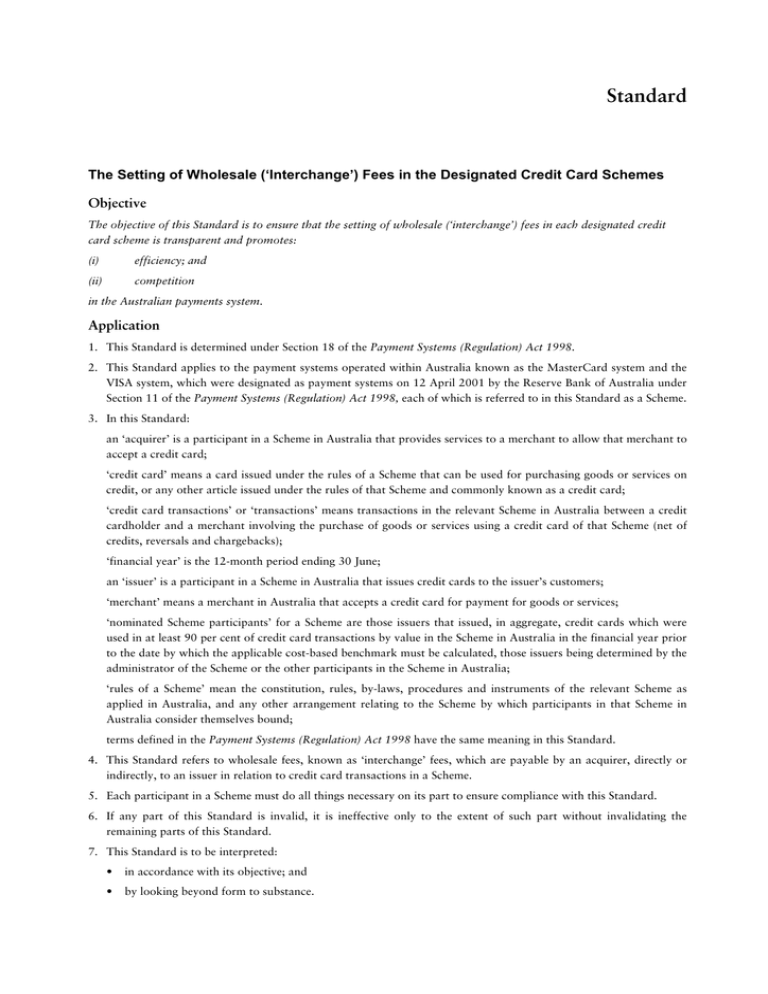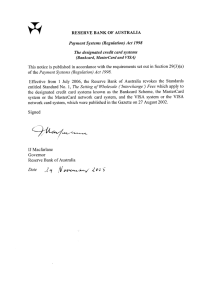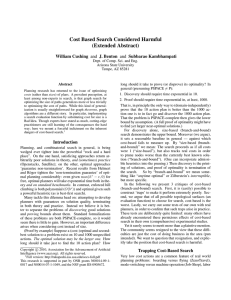Standard The Setting of Wholesale (‘Interchange’) Fees in the Designated Credit... Objective
advertisement

Standard The Setting of Wholesale (‘Interchange’) Fees in the Designated Credit Card Schemes Objective The objective of this Standard is to ensure that the setting of wholesale (‘interchange’) fees in each designated credit card scheme is transparent and promotes: (i) efficiency; and (ii) competition in the Australian payments system. Application 1. This Standard is determined under Section 18 of the Payment Systems (Regulation) Act 1998. 2. This Standard applies to the payment systems operated within Australia known as the MasterCard system and the VISA system, which were designated as payment systems on 12 April 2001 by the Reserve Bank of Australia under Section 11 of the Payment Systems (Regulation) Act 1998, each of which is referred to in this Standard as a Scheme. 3. In this Standard: an ‘acquirer’ is a participant in a Scheme in Australia that provides services to a merchant to allow that merchant to accept a credit card; ‘credit card’ means a card issued under the rules of a Scheme that can be used for purchasing goods or services on credit, or any other article issued under the rules of that Scheme and commonly known as a credit card; ‘credit card transactions’ or ‘transactions’ means transactions in the relevant Scheme in Australia between a credit cardholder and a merchant involving the purchase of goods or services using a credit card of that Scheme (net of credits, reversals and chargebacks); ‘financial year’ is the 12-month period ending 30 June; an ‘issuer’ is a participant in a Scheme in Australia that issues credit cards to the issuer’s customers; ‘merchant’ means a merchant in Australia that accepts a credit card for payment for goods or services; ‘nominated Scheme participants’ for a Scheme are those issuers that issued, in aggregate, credit cards which were used in at least 90 per cent of credit card transactions by value in the Scheme in Australia in the financial year prior to the date by which the applicable cost-based benchmark must be calculated, those issuers being determined by the administrator of the Scheme or the other participants in the Scheme in Australia; ‘rules of a Scheme’ mean the constitution, rules, by-laws, procedures and instruments of the relevant Scheme as applied in Australia, and any other arrangement relating to the Scheme by which participants in that Scheme in Australia consider themselves bound; terms defined in the Payment Systems (Regulation) Act 1998 have the same meaning in this Standard. 4. This Standard refers to wholesale fees, known as ‘interchange’ fees, which are payable by an acquirer, directly or indirectly, to an issuer in relation to credit card transactions in a Scheme. 5. Each participant in a Scheme must do all things necessary on its part to ensure compliance with this Standard. 6. If any part of this Standard is invalid, it is ineffective only to the extent of such part without invalidating the remaining parts of this Standard. 7. This Standard is to be interpreted: • in accordance with its objective; and • by looking beyond form to substance. 8. This Standard comes into force on 1 July 2006. 9. This Standard replaces Standard No. 1, The Setting of Wholesale (‘Interchange’) Fees which applies to each Scheme. Transition provision 10. If, prior to 1 November 2006, any interchange fee is introduced, varied, or removed in a Scheme, the average of interchange fees implemented in that Scheme in Australia on the date of that change, calculated in accordance with paragraph 20 below, must not exceed the benchmark for that Scheme calculated under Standard No. 1, The Setting of Wholesale (‘Interchange’) Fees. Interchange fees 11. From 1 November 2006, on each of the dates specified in paragraph 12, the average of interchange fees implemented in a Scheme in Australia, calculated in accordance with paragraph 20 below, must not exceed the common cost-based benchmark calculated in accordance with paragraphs 13 to 17 below. 12. For the purposes of paragraph 11, the dates are: (i) 1 November 2006 and 1 November of each third year thereafter; and (ii) the date any interchange fee is introduced, varied, or removed in that Scheme. Methodology 13. The cost-based measure for each Scheme is calculated as the value of eligible costs of the nominated Scheme participants in that Scheme for the financial year prior to the date by which the cost-based measure must be provided to the Reserve Bank of Australia, divided by the value of credit card transactions for the same period undertaken using credit cards issued by those nominated Scheme participants, expressed as a percentage. Eligible costs are: (i) issuers’ costs incurred principally in processing credit card transactions, including the costs of receiving, verifying, reconciling and settling such transactions; (ii) issuers’ costs incurred principally in respect of fraud and fraud prevention in connection with credit card transactions; (iii) issuers’ costs incurred principally in providing authorisation of credit card transactions; and (iv) issuers’ costs incurred in funding the interest-free period on credit card transactions, calculated using the average of the cash rate published by the Reserve Bank of Australia over the three financial years prior to the date by which the cost-based benchmark must be calculated. 14. Data on eligible costs must be drawn from accounting records of the nominated Scheme participants, prepared in accordance with generally accepted accounting principles and Australian accounting standards. 15. Data on eligible costs and the value of transactions of each nominated Scheme participant in each Scheme must be provided by that participant to an independent expert proposed by that Scheme and agreed to by the Reserve Bank of Australia. The expert must review the data to determine if the costs included are eligible costs and must use the data on eligible costs to calculate the cost-based measure for that Scheme. The expert must provide the cost-based measure and the aggregate data on eligible costs and the value of transactions used to calculate the cost-based measure to the Reserve Bank by 15 September of the year in which the cost-based measure must be calculated. 16. Each nominated Scheme participant for a Scheme must provide to the Reserve Bank of Australia by 15 September of the year in which the cost-based measure must be calculated: (i) the cost-based measure, the data on eligible costs and the value of transactions undertaken by it used by the independent expert to calculate the cost-based measure; (ii) the data on eligible costs described in (i) divided into the categories identified in paragraph 13 (i) – (iv) and the number of transactions undertaken by it in the financial year prior to the date by which the cost-based measure must be calculated using credit cards issued by the nominated Scheme participants. The administrator of a Scheme must provide to the Reserve Bank of Australia, by 15 September of the year in which the cost-based measure must be calculated, the number and value of transactions undertaken by all of the participants in the Scheme in the previous financial year. 17. The common cost-based benchmark is calculated by the Reserve Bank of Australia by weighting the individual scheme cost-based measures by the shares of each Scheme in the value of credit card transactions undertaken in all the Schemes. The Reserve Bank of Australia will publish the common cost-based benchmark by 30 September of the year in which the cost-based measure must be calculated. 18. The cost-based measure for a Scheme must be calculated in 2006 and each third year thereafter. If the Reserve Bank of Australia agrees in writing, a recalculation of the cost-based measure for a Scheme and of the common cost-based benchmark may be undertaken at other times if changes in eligible costs or other factors warrant. 19. The Reserve Bank of Australia may at any time, by notification on its website, waive or suspend the requirement to recalculate the cost-based measure and the common cost-based benchmark, in which case the common cost-based benchmark in force at that time will continue to apply. 20. For the purposes of paragraphs 10 and 11, the average of interchange fees in a Scheme is to be expressed as a percentage of transaction values. It is to be calculated by dividing the total interchange revenue that would have been payable had the interchange fees implemented on the dates specified in paragraph 10 or 12 been applicable in the previous financial year, by the value of transactions in that year. Transparency 21. The administrator of a Scheme or a representative of the participants in the Scheme in Australia must publish the interchange fee rates of the Scheme in Australia on the Scheme’s website or make the interchange fee rates generally available through other means. 22. The administrator of a Scheme must certify annually in writing to the Reserve Bank of Australia, on or before 30 November each year, that interchange fees of the Scheme in Australia over the prior twelve months ending 31 October were in compliance with this Standard.

